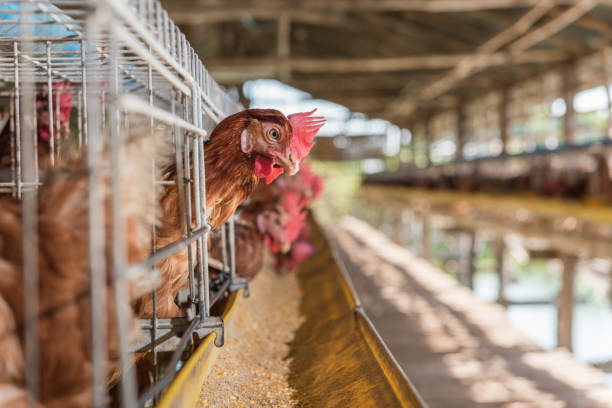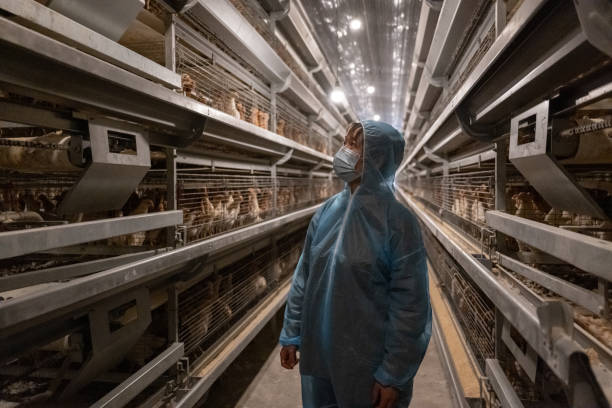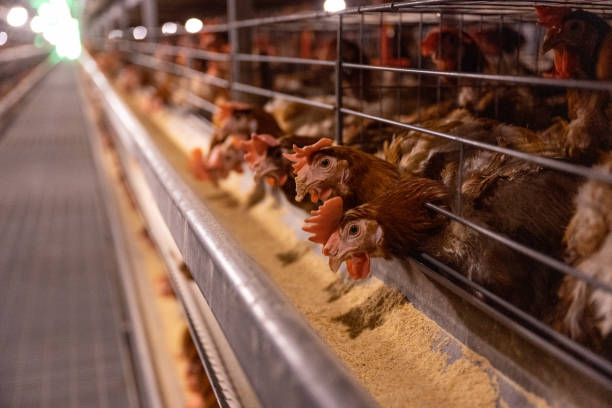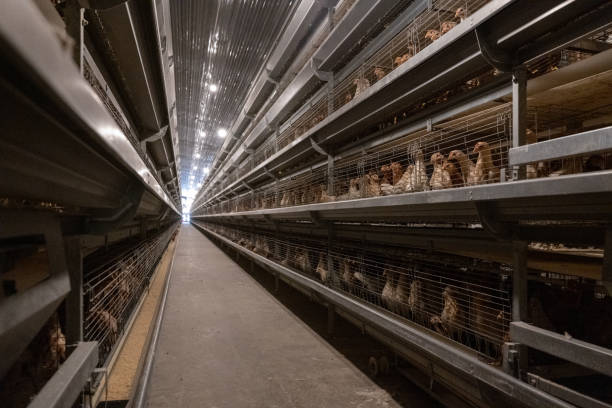
Chicken Cage Systems for Zambian Commercial Farms
Chicken Cage Systems for Zambian Commercial Farms
Raising chickens on a commercial scale in Zambia comes with unique challenges and opportunities — from climate considerations to evolving market demands. As the poultry industry grows across Africa, efficiency, hygiene, and cost-effectiveness have become top priorities for modern farmers. That’s where high-quality chicken cage systems come into play. At Livi Machinery, we specialize in designing and manufacturing smart, durable, and scalable chicken cage solutions tailored specifically for commercial farms in Zambia and across Sub-Saharan Africa.
For decades, traditional floor-rearing methods dominated Zambian poultry farming. While these systems are familiar and low-tech, they often lead to higher disease rates, poor feed conversion, and difficulty in scaling up operations. By upgrading to a structured chicken cage system, farmers can significantly improve biosecurity, reduce labor costs, and increase egg production or meat yield per bird. Our cages are engineered to handle Zambia’s warm temperatures and dusty conditions, featuring galvanized steel construction that resists rust and prolongs lifespan even in humid coops.
Whether you’re running a small-to-medium layer farm or planning a large-scale broiler setup, choosing the right cage system is critical to long-term success.
Why Modern Zambian Farms Are Switching to Caged Systems

The shift toward caged poultry farming in Zambia isn’t just about keeping up with global trends — it’s driven by real-world results. One of the biggest advantages of using chicken cages is improved animal health. In cage systems, droppings fall through the mesh floor, reducing contact between birds and waste. This simple design drastically lowers the risk of parasitic infections, coccidiosis, and respiratory diseases — common issues in deep-litter systems.
Additionally, caged setups allow for precise feeding and watering control. Automatic feeding lines can be integrated directly into multi-tier cage structures, ensuring every bird gets consistent nutrition without wastage. Similarly, nipple drinkers maintain clean water supply and minimize spillage, which helps keep the coop dry and odor-free. For Zambian farmers dealing with fluctuating feed prices, this level of efficiency translates directly into better profits.
Another key benefit is land use optimization. With vertical stacking options like 2-tier or 3-tier A-frame chicken cages, farmers can house more birds in less space. This is especially important near urban centers like Lusaka or Kitwe, where available farmland is shrinking due to population growth. A well-designed cage system allows you to double or even triple your flock size without expanding your building footprint.
We’ve worked with several Zambian clients who started with 500-bird floor pens and now manage over 10,000 layers in fully automated cage houses — all within the same barn area. The scalability offered by modular cage designs makes such transitions smooth and budget-friendly.

Choosing the Right Type of Chicken Cage for Your Farm
Not all chicken cages are created equal — and selecting the appropriate type depends on your production goals. In Zambia, three main types dominate commercial operations: layer cages for egg production, broiler (meat) cages for fast-growing chickens, and育雏笼 (brooder cages) for raising day-old chicks.
Layer cages are typically set in 2- or 3-tier configurations and equipped with roll-out trays that make egg collection effortless. These are ideal for farms supplying eggs to supermarkets, hotels, or processors. The slope of the wire mesh encourages hens to lay in designated areas, while anti-foot injury grids protect their claws. We offer models ranging from manual-managed units for starter farms to fully automatic systems with belt manure removal and centralized egg gathering — perfect for large producers aiming to export or supply major cities.
Broiler cages, though less common historically, are gaining popularity among progressive Zambian farmers focused on hygiene and survival rates. Unlike floor-raised broilers that sit in litter, birds in raised cages stay dry and clean, significantly lowering footpad burns and breast blisters. Our meat chicken cages feature wider mesh spacing and easy-access feeders suited for rapid weight gain. They also improve air circulation beneath the birds, helping them cope better during hot seasons.
For hatcheries and intensive rearing programs,育雏笼 (chick rearing cages) ensure high survival in the first few weeks. These compact units come with heating lamps, shallow feed trays, and fine mesh floors suitable for tiny chicks. Many of our customers use them for 4–6 weeks before transferring pullets to grower or layer cages. This phased approach improves uniformity and prepares young birds for optimal performance later in life.
Durability, customization, and ease of maintenance matter most when choosing equipment. That’s why our cages are made from hot-dipped galvanized steel — not just coated — so they withstand both mechanical stress and harsh cleaning agents. And because farm layouts vary widely across regions like Southern Province or Copperbelt, we provide site-specific design support to ensure seamless integration.
Beyond Cages: Building a Complete Smart Poultry Solution
A cage system is only one part of a modern poultry operation. To truly maximize productivity, smart integration of supporting infrastructure is essential. At Livi Machinery, we don’t just sell cages — we deliver turnkey solutions including ventilation fans, cooling pads, lighting controls, manure belts, and even solar-compatible power systems designed for off-grid Zambian farms.
Imagine walking into your chicken house each morning and knowing exactly how many eggs were collected overnight thanks to an automated data logger. Or receiving an SMS alert if the temperature rises above safe levels — even when you’re away at market. These intelligent add-ons are no longer luxuries; they’re practical tools that help Zambian farmers compete in a fast-evolving agricultural economy.
Installation is another area where proper guidance matters. Many farmers attempt DIY setups only to face alignment issues, uneven load distribution, or difficult access for feeding and cleaning. We offer full technical support, including pre-installation planning, video tutorials, and onsite assistance if needed. Every order includes detailed assembly manuals adapted to local conditions, along with spare parts kits to avoid delays.
And we understand that financing can be a hurdle. That’s why we partner with local distributors and cooperatives to offer flexible payment plans and group purchasing discounts. Whether you’re starting your first poultry venture or upgrading an existing facility, we’re here to make the transition as affordable and stress-free as possible.
Ready to Upgrade Your Zambian Poultry Farm?
If you’re looking to boost output, reduce losses, and operate a cleaner, more efficient chicken farm in Zambia, it’s time to consider a modern cage system from Livi Machinery. We’ve helped hundreds of African farmers transform their operations with reliable, weather-resistant equipment built to last over a decade.
Don’t let outdated methods hold back your farm’s potential. Share your contact details with us today — include your farm size, target production, and location — and we’ll send you a free customized layout proposal along with a quotation tailored to your needs. Let’s build a smarter future for Zambian poultry together.
Frequently Asked Questions
What types of chicken cages do you offer for Zambian farms?
We offer layer cages, broiler cages,育雏笼 (chick rearing cages), and custom multi-tier systems designed for tropical climates. All are made from hot-dip galvanized steel for rust resistance.
Can your cages handle Zambia’s high temperatures?
Yes, our cages are designed with ventilation in mind. When combined with tunnel ventilation and cooling pads, they perform excellently even in hot regions like Muchinga or Central Province.
Are the cage systems easy to assemble?
Absolutely. Each unit comes with numbered components and step-by-step guides. We also offer remote video support and can dispatch technicians for large projects.
Do you ship directly to Zambia?

Yes, we regularly ship container loads to ports in Dar es Salaam and Durban, with trucking arrangements to Lusaka, Ndola, Livingstone, and other major towns.
How long do your chicken cages last?
With proper care, our cages last 10–15 years or more. The galvanized coating prevents corrosion, and sturdy frame joints resist wear from daily use.
Can I integrate automation with your cages?
Definitely. Our cages are compatible with automatic feeding, drinking, egg collection, and manure removal systems. You can start simple and upgrade later.
What farm sizes are these systems suitable for?
From 500-bird starter units to 50,000+ capacity commercial houses — we design scalable systems for any operation.
Do you provide warranties?
Yes, all our cages come with a standard 5-year structural warranty against material defects.
Is training provided for new users?
We offer free online training sessions covering installation, maintenance, and best management practices for caged birds.
Can I visit a working farm using your systems in Africa?
We can connect you with reference farms in Kenya, Uganda, and Nigeria, and assist in arranging visits. Some Zambian clients also welcome peer-to-peer learning exchanges.
